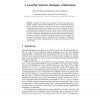Free Online Productivity Tools
i2Speak
i2Symbol
i2OCR
iTex2Img
iWeb2Print
iWeb2Shot
i2Type
iPdf2Split
iPdf2Merge
i2Bopomofo
i2Arabic
i2Style
i2Image
i2PDF
iLatex2Rtf
Sci2ools
117
Voted
IJEIS
2010
2010
A Good Role Model for Ontologies: Collaborations
Abstract. Ontologies are today used to annotate web data with machine processable semantics and for domain modeling. As the use of ontologies increases and the ontologies themselves grow larger, the need to construct ontologies in a component-based manner is becoming more and more important. In objectoriented software development, the notions of roles and role modeling have been known for many years. We argue that role models constitute attractive ontological units--components. Role models, among other things, provide separation of concerns in ontological modeling. This paper introduces roles to ontologies and discusses relevant issues related to transferring these techniques to ontologies. Examples of role models enabling separation of concerns and reuse are provided and discussed.
Related Content
| Added | 05 Mar 2011 |
| Updated | 05 Mar 2011 |
| Type | Journal |
| Year | 2010 |
| Where | IJEIS |
| Authors | Michael Pradel, Jakob Henriksson, Uwe Aßmann |
Comments (0)

